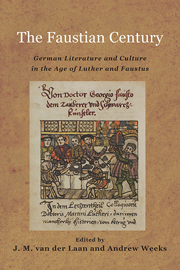Book contents
- Frontmatter
- Contents
- List of Illustrations
- Acknowledgments
- Introduction: Faust Scholarship and the Project at Hand
- 1 The German Faustian Century
- 2 Faustus of the Sixteenth Century: His Life, Legend, and Myth
- 3 Cornelius Agrippa's Double Presence in the Faustian Century
- 4 Converging Magical Legends: Faustus, Paracelsus, and Trithemius
- 5 Faust from Cipher to Sign and Pious to Profane
- 6 The Aesthetics of the 1587 Spies Historia von D. Johann Fausten
- 7 The Lutheran Faust: Repentance in the Augsburg Confession and the German Faustbuch
- 8 Marriage in the Historia von D. Johann Fausten (1587)
- 9 Antiauthoritarianism and the Problem of Knowledge in the Faustbuch
- 10 Exploring the “Three-Fold World”: Faust as Alchemist, Astrologer, and Magician
- 11 The Devil in the Early Modern World and in Sixteenth-Century German Devil Literature
- 12 Encounters with “Schwarz-Hans”: Jacob Böhme and the Literature of the Devil in the Sixteenth Century
- 13 D. Johann Faust and the Cannibals: Geographic Horizons in the Sixteenth Century
- A Sixteenth-Century Chronology of Significant References to Faust with Parallel World Events
- Select Bibliography
- Notes on the Contributors
- Index
11 - The Devil in the Early Modern World and in Sixteenth-Century German Devil Literature
Published online by Cambridge University Press: 05 May 2013
- Frontmatter
- Contents
- List of Illustrations
- Acknowledgments
- Introduction: Faust Scholarship and the Project at Hand
- 1 The German Faustian Century
- 2 Faustus of the Sixteenth Century: His Life, Legend, and Myth
- 3 Cornelius Agrippa's Double Presence in the Faustian Century
- 4 Converging Magical Legends: Faustus, Paracelsus, and Trithemius
- 5 Faust from Cipher to Sign and Pious to Profane
- 6 The Aesthetics of the 1587 Spies Historia von D. Johann Fausten
- 7 The Lutheran Faust: Repentance in the Augsburg Confession and the German Faustbuch
- 8 Marriage in the Historia von D. Johann Fausten (1587)
- 9 Antiauthoritarianism and the Problem of Knowledge in the Faustbuch
- 10 Exploring the “Three-Fold World”: Faust as Alchemist, Astrologer, and Magician
- 11 The Devil in the Early Modern World and in Sixteenth-Century German Devil Literature
- 12 Encounters with “Schwarz-Hans”: Jacob Böhme and the Literature of the Devil in the Sixteenth Century
- 13 D. Johann Faust and the Cannibals: Geographic Horizons in the Sixteenth Century
- A Sixteenth-Century Chronology of Significant References to Faust with Parallel World Events
- Select Bibliography
- Notes on the Contributors
- Index
Summary
The Devil versus God in the Late Middle Ages and Early Modern Times
While God has certainly been one of the most important subjects of Western literature, the devil matches that popularity in a Manichaean-like symmetry. Indeed, the good and evil they incorporate are among the fundamental issues of literature. A detailed probing of the ways individual writers in any particular period reflected those polar opposites would be an inexhaustible undertaking. Nevertheless, we can observe a remarkable increase in the interest in, fascination with, and fear of the devil during the late Middle Ages and the early modern period. The increase is parallel to the growth of widespread superstition. In fact, the curious sense of the end of time, occasionally even in an apocalyptic sense, throughout the fifteenth century and the realization of an impending paradigm shift that characterized the entire transitional period from the fifteenth to the sixteenth century almost automatically led to an intense treatment of the devil in myriad manifestations. Johan Huizinga points to the pervasive and provocative role of the devil in the late Middle Ages not long before the obsession with witches became epidemic. However, the widespread interest in the devil, which found expression in popular literature, did not fully emerge until the sixteenth century.
- Type
- Chapter
- Information
- The Faustian CenturyGerman Literature and Culture in the Age of Luther and Faustus, pp. 257 - 284Publisher: Boydell & BrewerPrint publication year: 2013



